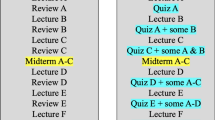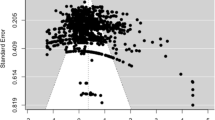Abstract
This study explores the impact of ‘Scientific Communication’ (SC) skills instruction on students’ performances in scientific literacy assessment tasks. We present a general model for skills instruction, characterized by explicit and spiral instruction, integration into content learning, practice in several scientific topics, and application of performance tasks. The model was applied through an instructional program that focuses on the following learning skills: information retrieval, scientific reading and writing, listening and observing, data representation, and knowledge presentation. Throughout the 7th–8th grades, 160 students learned the whole program or one of its components: structured instruction (SI) of SC skills, or performance tasks (PT). A comparison group of 42 students did not receive instruction of SC skills. Students’ performances were assessed through a questionnaire and a complex task that measured students’ scientific content knowledge, SC skills, and the quality of the final products. Results indicated that students who learned the whole program or one of its components achieved higher scores in all categories than the comparison group students. High achievers can benefit from just one component of the program: either structured instruction (SI) or learning from practice (PT). However, they can hardly acquire SC skills spontaneously. Low and average achievers require both components of the SC program to improve their performances. Results show that without planned intervention, the spontaneous attainment of SC skills occurs only to a limited extent. Systematic teaching of skills can make a significant difference. The explicit instruction of skills integrated into scientific topics, the opportunities to implement the skills in different contexts, the role of performance tasks as ‘assessment for learning’—all these features are important and necessary for improving students’ scientific literacy. Our general model of skills instruction can be applied to the instruction of other high-order skills. Its application can lead to the realization of the central goal of science education: literate students possessing scientific knowledge.
Similar content being viewed by others
References
Agresti, A. (1990). Categorical data analysis. New York: Wiley.
American Association for the Advancement of Science (AAAS) (1990). Science for all Americans: Project 2061. New York: Oxford University Press.
American Association for the Advancement of Science (1993). Benchmarks for science literacy. New York: Oxford University Press Available at: http://www.project2061.org/publications/bsl/online/bolintro.htm.
Anderson, R. D., & Helms, J. V. (2001). The ideal of standards and the reality of schools: Needed research. Journal of Research in Science Teaching, 38, 3–16.
Bangert-Drowns, R. L., Hurley, M. M., & Wilkinson, B. (2004). The effects of school-based writing-to-learn interventions on academic achievement: A meta-analysis. Review of Educational Research, 74, 29–58.
Bennett, S. W. (1999). Skills taxonomy driver for designing an independent learning course in environmental chemistry. Pure and Applied Chemistry, 71, 851–857.
Berliner, D. C. (1992). Redesigning classroom activities for the future. Educational Technology, 32, 7–13.
Black, P., & Wiliam, D. (1998). Inside the black box: Raising standards through classroom assessment. London: School of Education, King’s College.
Bol, L., & Strage, A. (1996). The contradiction between teacher’s instructional goals and their assessment practices in high school biology courses. Science Education, 80, 145–163.
BSCS (1993). Developing biological literacy pp. 107–124. Dubuque, Iowa: Kendall/Hunt.
Bybee, R. W. (1977). Achieving scientific literacy: From purpose to practice. Portsmouth, NH: Heinemann.
Bybee, R. W., & Ben-Zvi, N. (1998). Science curriculum: transforming goals to practices. In B. J. Fraser, & K. G. Tobin (Eds.), International handbook of science education (pp. 487–498). Dordrecht: Kluwer Academic Publishers.
Campbell, B., Kaunda, L., Allie, S., Buffler, A., & Lubben, F. (2000). The communication of laboratory investigations by university entrants. Journal of Research in Science Teaching, 37, 839–853.
Castello, M., & Monereo, C. (1999). Teaching learning strategies in compulsory secondary education. 8th European Conference for Research on Learning and Instruction, Sweden.
Champagne, A. B., Lovitts, B. E., & Callinger, B. J. (Eds.) (1990). This year in school science. 1990: Assessment in the service of instruction. Washington, DC: American Association for the Advancement of Science.
Coll, R. K., Taylor, N., & Lay, M. C. (2008). Scientists’ habits of mind as evidenced by the interaction between their science training and religious beliefs. International Journal of Science Education, 1–31, iFirst Article. Available at: http://pdfserve.informaworld.com/82088_902013943_787688349.pdf.
Davidson, J. E., & Sternberg, R. J. (1985). Competence and performance in intellectual development. In E. D. Neimark, R. De Lisi, & J. L. Newman (Eds.), Moderators of competence (pp. 43–76). Hillsdale, NJ: Lawrence Erlbaum Associates.
DeBoer, G. E. (2000). Scientific literacy: Another look at its historical and contemporary meaning and its relationship to science education reform. Journal of Research in Science Teaching, 37, 582–601.
Dienes, Z., & Berry, D. (1997). Implicit learning: Below the subjective threshold. Psychonomic Bulletin & Review, 4, 3–23.
Edelson, D. C. (1998). Realising authentic science learning through the adaptation of science practice. In B. J. Fraser, & K. G. Tobin (Eds.), International handbook of science education (pp. 317–331). Dordrecht: Kluwer Academic Publishers.
Erickson, G., & Meyer, K. (1998). Performance assessment tasks in science: What are they measuring? In B. J. Fraser, & K. G. Tobin (Eds.), International handbook of science education (pp. 761–789). Dordrecht: Kluwer Academic Publishers.
Eylon, B., & Linn, M. C. (1988). Learning and instruction: an examination of four research perspectives in science education. Review of Educational Research, 58, 251–301.
Fleiss, J. L. (1981). Statistical methods for rates and proportions. New York: Wiley.
Gibbs, G. (1981). Teaching students to learn: A student-centered approach. Great Britain: Open University.
Garvey, W. D., & Griffith, B. C. (1972). Communication and information processing within scientific disciplines: Empirical findings for psychology. Information Storage and Retrieval, 8, 123–126.
Gauld, C. F. (1982). The scientific attitude and science education: A critical reappraisal. Science Education, 66, 109–121.
Gauld, C. F. (2005). Habits of mind, scholarship and decision making in science and religion. Science & Education, 14, 291–308.
Gauld, C. F., & Hukins, A. A. (1980). ‘Scientific attitudes: A review. Studies in Science Education, 7, 129–161.
Hara, K. (1997). A comparison of three methods of instruction for acquiring information skills. Educational Research, 39, 271–286.
Hogan, K. (1999). Thinking aloud together: a test of an intervention to foster students’ collaborative scientific reasoning. Journal of Research in Science Teaching, 36, 1085–1109.
Hudgins, B. B., Riesenmy, M. R., Mitchell, S., Klein, C., & Navarro, V. (1994). Teaching self-direction to enhance children’s thinking in physical science. Journal of Educational Research, 88, 15–27.
Hurd, J. M. (2000). The transformation of scientific communication: A model for 2020. Journal of the American Society for Information Science, 51(14), 1279–1283.
Kerstiens, G. (1998). Studying in college, then & now: An interview with Walter Pauk. Journal of Developmental Education, 21, 20–24.
Kirkwood, M. (2000). Infusing higher-order thinking and learning to learn into content instruction: a case study of secondary computing studies in Scotland. Journal of Curriculum Studies, 32, 509–535.
Klein, D. P. (2006). The challenges of scientific literacy: From the view point of second generation cognitive science. International Journal of Science Education, 28(2–3), 143–178.
Krajcik, J. S., Blumenfeld, P. C., Marx, R. W., Bass, C. M., & Fredricks, J. (1998). Inquiry in project-based science classrooms: Initial attempts by middle school students. Journal of the Learning Sciences, 7, 313–350.
Kulm, G., & Malcom, S. M. (1991). Science assessment in the service of reform. Washington, DC: American Association for the Advancement of Science.
Laugksch, R. C. (2000). Scientific literacy: A conceptual overview. Science Education, 84, 71–94.
Linn, M. C., diSessa, A., Pea, R. D., & Songer, N. B. (1994). Can research on science learning and instruction inform standards for science education? Journal of Science Education and Technology, 3, 7–15.
Merton, R. K. (1976). Sociological ambivalence and other essays. New York: Free Press.
National Research Council (1996). National science education standards. Washington, DC: National Academy Press.
Onwuegbuzie, A. J., Slate, J. R., & Schwartz, R. A. (2001). Role of study skills in graduate-level educational research courses. The Journal of Educational Research, 94, 238–246.
Oosterhuis-Geers, J. (1993). PROcedure to promote effective and efficient study skills (PROPES) with PA-students. Paper presented at the Annual Meeting of the American Educational Research Association. Atlanta, GA.
Patronis, T., Potari, D., & Spiliotopoulou, V. (1999). Students’ argumentation in decision making on socio-scientific issue: Implications for teaching. International Journal of Science Education, 21, 745–754.
PISA (2003). Available at: http://www.pisa.oecd.org/science/struct.htm.
Rivard, L. P., & Straw, S. B. (2000). The effects of talk and writing on learning science: An exploratory study. Science Education, 84, 566–593.
Roth, W. M., & Roychoudhury, A. (1993). The development of science process skills in authentic contexts. Journal of Research in Science Teaching, 30, 127–152.
Ruiz-Primo, M. A., Shavelson, R. J., Hamilton, L., & Klein, S. (2002). On the evaluation of systemic science education reform: Searching for instructional sensitivity. Journal of Research in Science Teaching, 39, 369–393.
Scherz Z., Eylon, B., & Bialer, L. (2008). Professional Development in Learning Skills for Science (LSS): the use of Evidence-Based Framework. International Journal of Research in Science Education, 30, 643–668.
Scherz, Z., Michman, M., & Tamir, P. (1985). Preparing academically disadvantaged students. Journal of College Science Teaching, March-April, 395–401.
Scherz Z., Spektor-Levy, O., & Eylon, B. (2005). Scientific Communication: An instructional program for high-order learning skills and its impact on students’ performance. In: K. Boersma, M. Goedhart, O. de-Jong & H. Eijkelhof (Eds.), Research and the Quality of Science Education (pp. 231–243). Netherlands: Springer.
Schneider, R. M., Krajcik, J., Marx, R. W., & Soloway, E. (2002). Performance of students in project-based science classrooms on a national measure of science achievement. Journal of Research in Science Teaching, 39, 410–422.
Shamos, M. H. (1995). The myth of scientific literacy. Rutgers, NJ: Rutgers Univ. Press.
Simonneaux, L. (2001). Role-play or debate to promote students’ argumentation and justification on an issue in animal transgenesis. International Journal of Science Education, 23, 903–927.
Spektor-Levy, O., Eylon, B. & Scherz, Z. (2008). Teaching communication skills in science: Tracing teacher change. Teaching and Teacher Education, 24, 462–477.
Squire, J. (1983). Composing and comprehending: Two sides of the same basic process. Language Arts, 60, 581–589.
Straka, G. A., Nenniger, P., Spevacek, G., & Wosnitza, M. (1996). A model for motivated self-directed learning. Education, 53, 19–29.
TIMMS (1999). Science Items. Available at: http://isc.bc.edu/timss1999i/pdf/t99science_items.pdf.
TIMMS (2003). Available at: http://nces.ed.gov/timss/.
Wiggins, G. (1998). Educative assessment: Designing assessments to inform and improve student performance. San Francisco, Calif.: Jossey-Bass.
Wolf, D. P. (1993). Assessment as an episode of learning. In R. E. Bennet, & W. C. Ward (Eds.), Construction versus choice in cognitive measurement. NJ: Lawrence Erlbaum.
Yore, D. L., Bisanz, L. G., & Hand, M. B. (2003). Examining the literacy component of science literacy: 25 years of language arts and science research. International Journal of Science Education, 25, 689–725.
Zohar, A., & Dori, Y. J. (2003). Higher order thinking skills and low-achieving students: Are they mutually exclusive? The Journal of the Learning Sciences, 12, 145–181.
Zohar, A., & Nemet, F. (2002). Fostering students’ knowledge and argumentation shills through dilemmas in human genetics. Journal of Research in Science Teaching, 39, 35–62.
Author information
Authors and Affiliations
Corresponding author
Rights and permissions
About this article
Cite this article
Spektor-Levy, O., Eylon, BS. & Scherz, Z. TEACHING SCIENTIFIC COMMUNICATION SKILLS IN SCIENCE STUDIES: DOES IT MAKE A DIFFERENCE?. Int J of Sci and Math Educ 7, 875–903 (2009). https://doi.org/10.1007/s10763-009-9150-6
Received:
Accepted:
Published:
Issue Date:
DOI: https://doi.org/10.1007/s10763-009-9150-6




